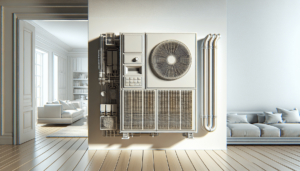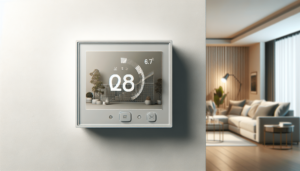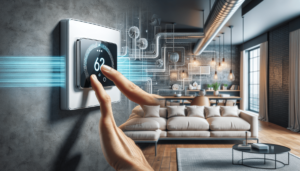

HVAC Services
Get Professional Repairs From The Area's Trusted HVAC Technicians. Ask About Our Services! We Offer Professional Heating & Cooling System Repairs And Guarantee Long-Lasting Results.
Got Question? Call us: (850) 678-2665Financing
Why Regular Maintenance is Essential for HVAC Systems
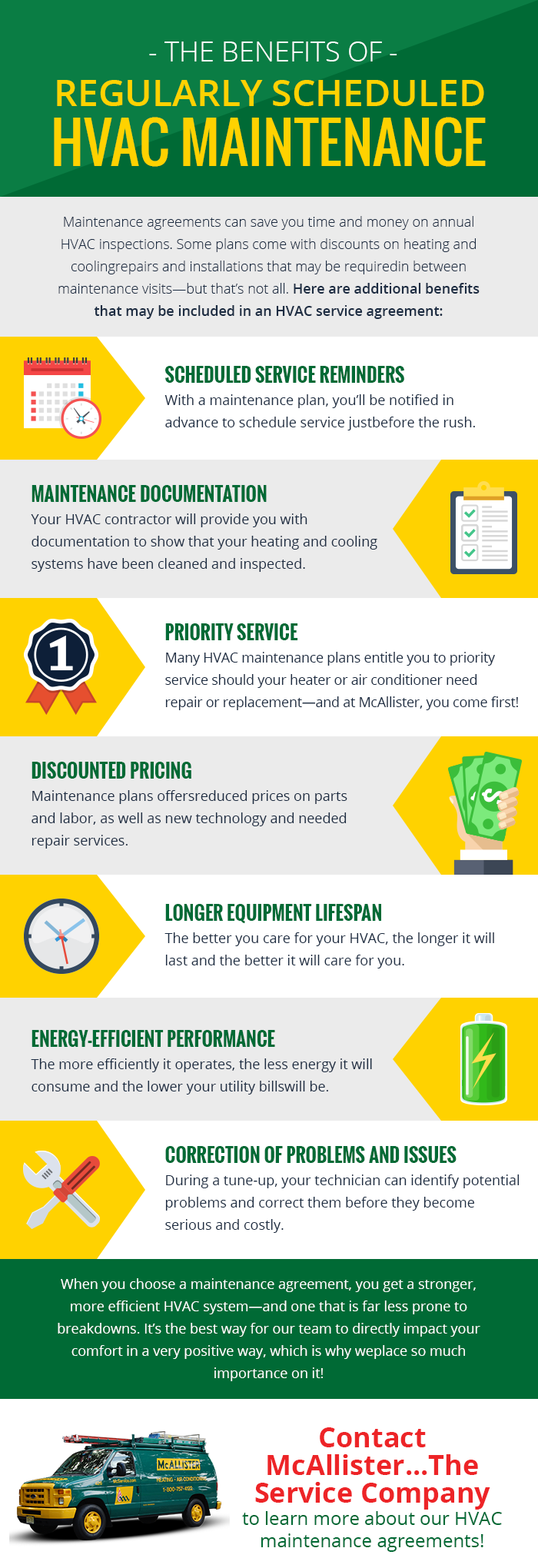
Maintaining your HVAC system is crucial for its smooth operation and long lifespan. Regular maintenance ensures that your system functions at its optimal efficiency, saving you money on energy bills. Additionally, it helps prevent costly repairs by identifying potential issues early on. At Tempacure Heating and Air Conditioning, we specialize in HVAC service repair and maintenance in Niceville FL and the surrounding area. Contact us at (850) 678-2665 or visit our website https://tempacurehvac.com to learn more about the importance of regular maintenance and how we can help you keep your HVAC system in top shape.
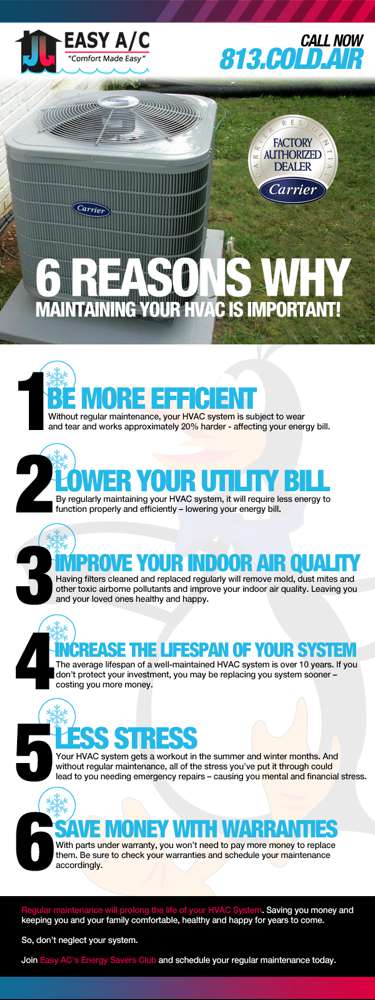
This image is property of www.easyac.net.
I. Benefits of Regular Maintenance
Regular maintenance is essential for keeping your HVAC system in top shape and ensuring it performs efficiently throughout the year. By investing in regular maintenance, you can enjoy a range of benefits that will enhance your comfort, save you money, and promote a healthier indoor environment.
A. Increased Energy Efficiency
One of the primary benefits of regular maintenance is increased energy efficiency. When your HVAC system is clean, well-maintained, and operating at its optimal level, it requires less energy to cool or heat your home. This leads to significant energy savings and lower utility bills. Regular maintenance tasks such as cleaning coils and replacing air filters help improve airflow and reduce strain on the system, allowing it to operate more efficiently.
B. Improved Air Quality
Another important benefit of regular HVAC maintenance is improved air quality. Over time, dust, dirt, pollen, and other pollutants can accumulate in your system, leading to poor indoor air quality. Regularly cleaning and Maintaining your HVAC system helps remove these contaminants, preventing them from circulating throughout your home. This is especially crucial for individuals with allergies or respiratory conditions as it can alleviate symptoms and promote a healthier living environment.
C. Extended Lifespan
Proper maintenance can significantly extend the lifespan of your HVAC system. By regularly inspecting and servicing your system, technicians can identify and address any issues before they become major problems. This proactive approach helps prevent breakdowns and costly repairs, prolonging the life of your equipment. Investing in regular maintenance is a smart long-term strategy that can save you from the expense and inconvenience of premature HVAC system replacement.
D. Cost Savings
Regular maintenance not only saves you money on energy bills but also helps you avoid expensive repairs and replacements. By catching small issues early and addressing them promptly through maintenance, you can prevent them from escalating into larger, more costly problems. Additionally, a well-maintained HVAC system operates more efficiently, reducing wear and tear on components and minimizing the risk of major malfunctions. Ultimately, the cost savings gained from regular maintenance can far outweigh the investment you make in preventive care.
II. Components of HVAC System Maintenance
To fully understand the importance of regular maintenance, it’s essential to know the key components that require attention. HVAC system maintenance involves several critical areas that need to be inspected, cleaned, and serviced regularly.
A. Air Filters
Air filters play a crucial role in maintaining indoor air quality and protecting your HVAC system from dust and debris. These filters trap particles and contaminants, preventing them from circulating into your living spaces. Over time, air filters can become clogged and dirty, reducing airflow and causing strain on your system. Regularly checking and replacing air filters, typically every 1-3 months, ensures proper ventilation, improves energy efficiency, and promotes cleaner air.
B. Coils
Both the evaporator coil and condenser coil in your HVAC system need regular maintenance to function effectively. Over time, these coils can accumulate dirt, dust, and debris, reducing their efficiency. Regular coil cleaning helps maintain proper heat transfer, improves system performance, and prevents potential damage or breakdowns. It’s advisable to have a professional technician clean your coils at least once a year to ensure they are free from any buildup.
C. Ductwork
The ductwork of your HVAC system is responsible for distributing conditioned air throughout your home. Over time, ducts can develop leaks, cracks, or accumulations of dust and debris. These issues can result in reduced airflow, energy loss, and poor indoor air quality. Regular inspections and professional cleaning can help identify and address ductwork issues, ensuring optimal airflow, energy efficiency, and improved air quality.
D. Blower Motors
The blower motor in your HVAC system is responsible for circulating conditioned air throughout your home. Regular maintenance of the blower motor involves cleaning the fan blades, lubricating bearings, and ensuring that the system is balanced and vibration-free. Neglected blower motors can become less efficient over time, leading to reduced airflow and comfort issues. Regular maintenance ensures that the blower motor operates smoothly and at its optimal level.
E. Thermostats
While often overlooked, thermostats play a vital role in your HVAC system’s operation and energy efficiency. Regularly calibrating and testing the accuracy of your thermostat helps ensure that your HVAC System functions as intended. Properly calibrated thermostats allow for accurate temperature readings, efficient operation, and optimal comfort levels.
F. Refrigerant Levels
Maintaining proper refrigerant levels in your HVAC system is crucial for efficient cooling. Over time, refrigerant levels can drop due to leaks or other issues, leading to reduced cooling performance and potential damage to your system. Regularly checking and maintaining the correct refrigerant levels ensures that your system operates at its peak efficiency and prolongs the life of your equipment.
III. Frequency of Maintenance
HVAC system maintenance should be performed at different intervals to keep your system running smoothly and prevent any potential issues. To maximize the benefits of regular maintenance, it’s important to understand the recommended frequency of maintenance tasks.
A. Seasonal Maintenance
Seasonal maintenance should be performed at least twice a year, ideally before the cooling and heating seasons. Before summer begins, it’s crucial to have your system serviced to ensure optimal cooling performance. Likewise, before winter arrives, it’s essential to have your system inspected and maintained for efficient heating during the colder months. Seasonal maintenance usually involves cleaning components, checking for leaks, testing safety controls, and lubricating moving parts.
B. Regular Check-ups
In addition to seasonal maintenance, regular check-ups throughout the year can help catch any potential issues before they become major problems. These check-ups typically involve filter replacements, inspection of electrical connections, checking thermostat calibration, and overall system performance evaluation. Depending on your specific needs and usage patterns, regular check-ups should be performed by a professional technician at least once or twice a year.
C. Preventive Maintenance Plans
Many HVAC contractors offer preventive maintenance plans that provide ongoing care for your system throughout the year. These plans typically include scheduled maintenance visits, priority service, and discounts on parts and repairs. Signing up for a preventive maintenance plan can offer peace of mind, knowing that your HVAC system is being regularly monitored and maintained by professionals.
IV. DIY vs Professional Maintenance
When it comes to HVAC system maintenance, you may wonder whether you should tackle the tasks yourself or hire a professional technician. While some maintenance tasks can be done as DIY projects, others require the expertise and equipment of a trained professional.
A. DIY Maintenance
Simple maintenance tasks such as changing air filters can often be done by homeowners with basic tools and knowledge. Regularly replacing air filters, cleaning the area around the outdoor unit, and ensuring proper airflow by keeping vents clear are examples of DIY maintenance tasks. However, it’s important to remember that attempting complex maintenance tasks without experience or proper training can result in damage to your system or potential safety hazards.
B. Professional Maintenance
Professional maintenance is essential for tasks that require specialized expertise and tools. Professional technicians are trained to inspect, diagnose, and service HVAC systems accurately. They have the knowledge to identify potential issues, clean components effectively, and ensure that your system operates at its best. Professional maintenance visits typically include a thorough inspection of all components, cleaning, lubrication, and any necessary adjustments or repairs.
C. When to Seek Professional Help
While there are maintenance tasks you can handle on your own, certain signs indicate it’s time to call a professional. If you notice insufficient cooling or heating, strange noises coming from your system, foul odors, abnormally high utility bills, or uneven air distribution, it’s best to seek professional help. These signs often indicate underlying issues that require the expertise of a trained technician.
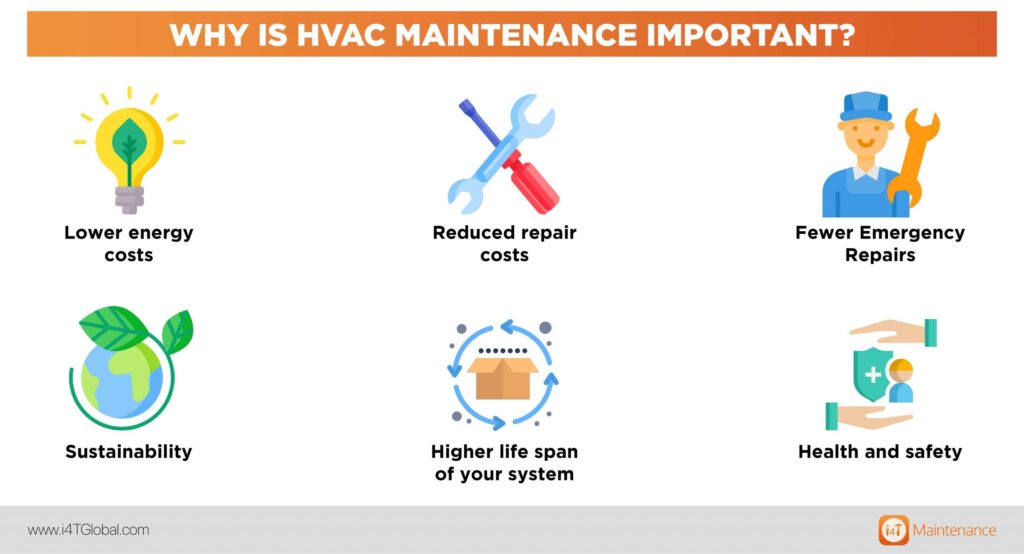
This image is property of i4tglobal.com.
V. Signs of HVAC System Issues
Knowing the signs of potential HVAC system issues is vital in maintaining the comfort and performance of your system. By recognizing these signs early on, you can take appropriate action and prevent further damage or costly repairs.
A. Insufficient Cooling or Heating
If your HVAC system is no longer providing adequate cooling or heating, it may be a sign of a problem. Insufficient cooling could indicate issues such as refrigerant leaks, a malfunctioning compressor, or blocked airflow. Insufficient heating could be a result of a faulty thermostat, a defective heating element, or an issue with the ignition system. Seeking professional assistance can help diagnose and resolve these issues effectively.
B. Strange Noises
Unusual sounds coming from your HVAC system, such as rattling, banging, or squealing, should not be ignored. These noises can indicate loose or damaged components, worn-out belts, or problems with motors or fans. Regular maintenance and prompt repairs can help eliminate these noises and ensure smooth operation.
C. Foul Odors
Foul odors emanating from your HVAC system can be a sign of mold or mildew growth, accumulation of dirt or debris, or even a dead animal in your ductwork. These odors can adversely affect your indoor air quality and potentially pose health risks. Professional inspection and cleaning can eliminate the source of these odors and improve your indoor air quality.
D. High Utility Bills
A sudden increase in your utility bills without an apparent reason can indicate an inefficient HVAC system. Factors such as clogged filters, dirty coils, or leaky ducts can cause your system to work harder and consume more energy. Regular maintenance can address these issues, improve energy efficiency, and lower your utility bills.
E. Uneven Air Distribution
If you notice uneven airflow throughout your home, with certain rooms being too hot or too cold, it may be a sign of an airflow or ductwork issue. Blocked or leaky ducts, improperly configured dampers, or a malfunctioning blower motor can all cause uneven air distribution. Professional inspection and maintenance can help identify and rectify these issues, ensuring consistent comfort in every room.
VI. Common Maintenance Tasks and Tips
Performing regular maintenance tasks is essential for ensuring the longevity and optimal performance of your HVAC system. Here are some common maintenance tasks and tips to help you keep your system in top shape.
A. Changing Air Filters
Regularly changing air filters is crucial for maintaining proper airflow and preventing dust and debris from accumulating in your system. Check your filters monthly and replace them according to the manufacturer’s recommendations.
B. Cleaning Coils
Clean coils are essential for efficient heat transfer and optimal system performance. Use a soft brush or vacuum cleaner to remove dirt and debris from the coils. For a thorough cleaning, consider hiring a professional technician annually.
C. Sealing Ductwork
Leaky ducts can result in energy loss, reduced airflow, and compromised indoor air quality. Inspect your ductwork for visible leaks or signs of damage. Use duct sealant or foil tape to seal any leaks, ensuring that your conditioned air reaches its intended destinations.
D. Lubricating Moving Parts
Moving parts in your HVAC system, such as fan motors or bearings, require regular lubrication to operate smoothly. Use a manufacturer-recommended lubricant to ensure proper lubrication without causing damage.
E. Calibrating Thermostat
Calibrating your thermostat helps ensure accurate temperature readings and optimal system performance. Consult your thermostat’s manual or hire a professional to calibrate your thermostat as needed.
F. Checking Refrigerant Levels
Proper refrigerant levels are vital for efficient cooling. Consult your system’s manual or hire a professional to check and adjust refrigerant levels as necessary. Only trained technicians should handle refrigerant-related tasks.
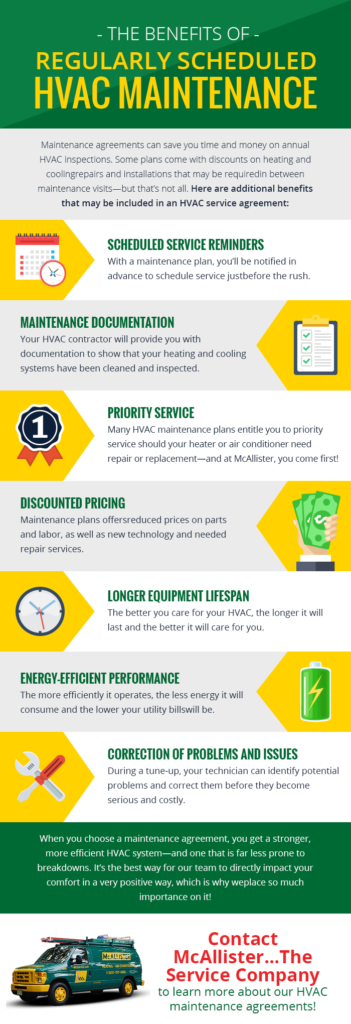
This image is property of www.mcservice.com.
VII. Hiring a Reliable HVAC Contractor
When it comes to HVAC system maintenance, hiring a reliable and reputable contractor is crucial. Here are some factors to consider when choosing an HVAC contractor.
A. Research and Recommendations
Do thorough research and ask for recommendations from friends, family, or neighbors who have had positive experiences with HVAC contractors. Online reviews and ratings can also provide valuable insights into a contractor’s reliability and quality of service.
B. Certifications and Licenses
Ensure that the HVAC contractor you choose holds the necessary certifications and licenses required by your state or region. These certifications indicate that the contractor has met specific industry standards and possesses the knowledge and expertise to handle HVAC systems effectively.
C. Experience and Expertise
Look for contractors with ample experience in the HVAC industry. Experienced contractors are more likely to have encountered a wide range of issues and are better equipped to handle any problems that may arise. Consider their expertise in servicing and maintaining the specific type of HVAC system you have.
D. Written Estimate and Contracts
Obtain written estimates from multiple contractors before making a decision. This allows you to compare prices, services, and warranties. Additionally, ensure that the contractor provides a detailed contract outlining the scope of work, timelines, and any guarantees or warranties offered.
E. References and Reviews
Ask potential contractors for references from previous customers and follow up with those references to get a better understanding of their experience with the contractor. Online reviews and testimonials can also provide insights into the contractor’s reputation and customer satisfaction.
VIII. Cost of HVAC Maintenance
The cost of HVAC maintenance can vary depending on several factors. Understanding these factors can help you budget and make informed decisions about your maintenance needs.
A. Factors Affecting Cost
Several factors can influence the cost of HVAC maintenance, including the size and complexity of your system, its age and condition, the frequency and extent of maintenance required, and the region in which you live. Additional costs may also arise if repairs or replacements are necessary.
B. Cost of Regular Maintenance
The cost of regular maintenance typically involves the service fees charged by HVAC contractors, which can vary. Some contractors may offer flat-rate packages that cover specific maintenance tasks, while others may charge an hourly rate. The cost of filter replacements and any necessary supplies or parts should also be considered.
C. Potential Cost Savings
While there is a cost associated with HVAC maintenance, the potential cost savings can outweigh this investment. Regular maintenance helps prevent major breakdowns and expensive repairs. It also improves energy efficiency, leading to lower utility bills. Additionally, a well-maintained HVAC system can have an extended lifespan, delaying the need for costly replacements.
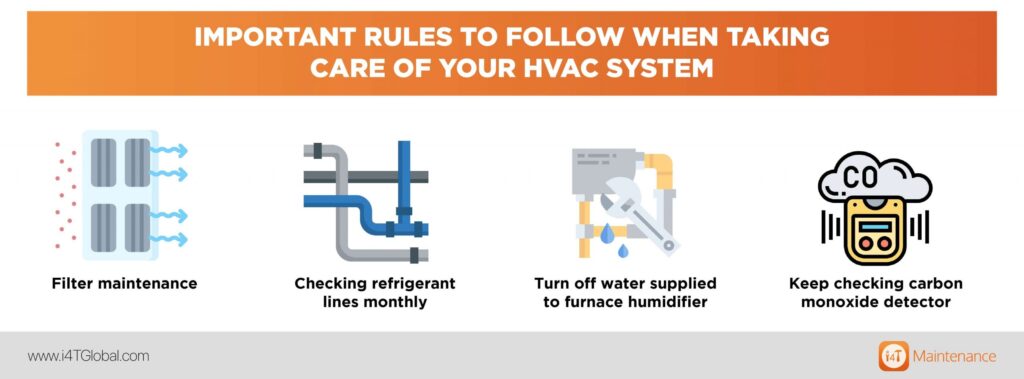
This image is property of i4tglobal.com.
IX. Conclusion
Regular maintenance is crucial for keeping your HVAC system in optimal condition and ensuring it performs efficiently year-round. The benefits of regular maintenance include increased energy efficiency, improved air quality, extended lifespan, and cost savings. By addressing key components such as air filters, coils, ductwork, blower motors, thermostats, and refrigerant levels, you can maintain a well-functioning system. Understanding the frequency of maintenance tasks and the differences between DIY and professional maintenance is essential for making informed decisions. Recognizing signs of HVAC system issues allows you to take prompt action and prevent further damage. By following common maintenance tasks and tips and hiring a reliable contractor, you can achieve long-lasting benefits. While there is a cost associated with HVAC maintenance, the potential cost savings make it a worthwhile investment. Regular maintenance ensures the longevity, efficiency, and comfort of your HVAC system, providing you with a healthy and comfortable indoor environment for years to come.


